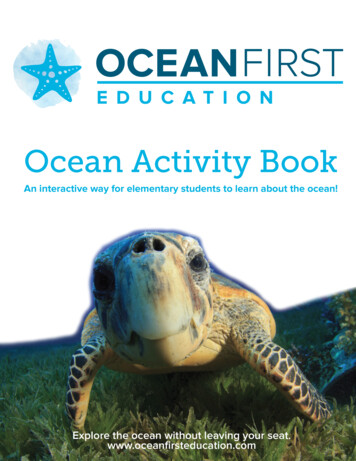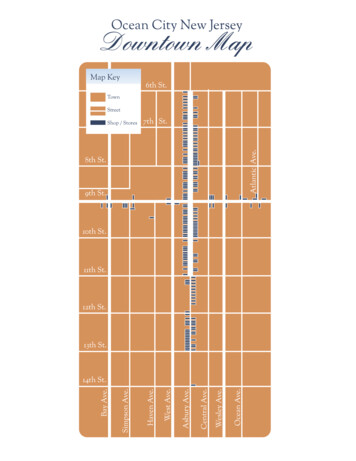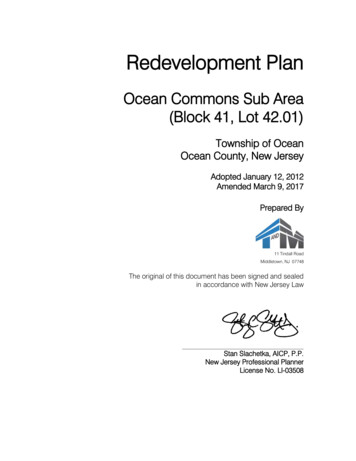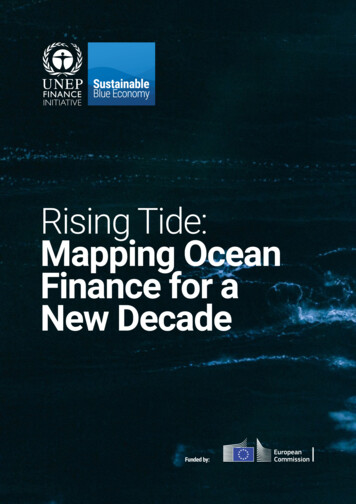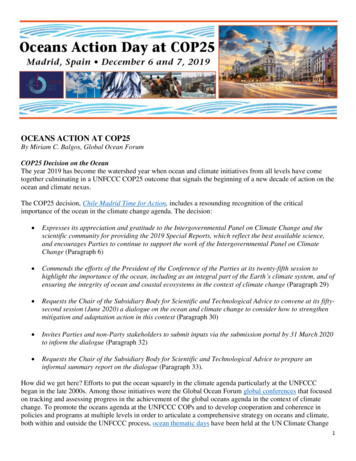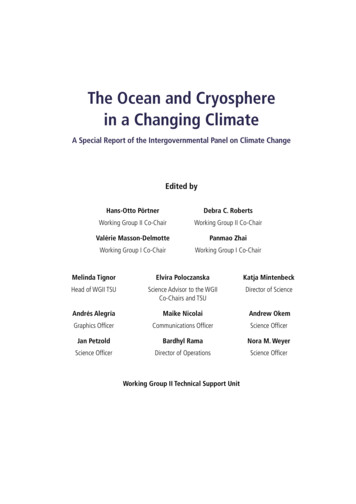
Transcription
The Ocean and Cryospherein a Changing ClimateA Special Report of the Intergovernmental Panel on Climate ChangeEdited byHans-Otto PörtnerDebra C. RobertsWorking Group II Co-ChairWorking Group II Co-ChairValérie Masson-DelmottePanmao ZhaiWorking Group I Co-ChairWorking Group I Co-ChairMelinda TignorElvira PoloczanskaKatja MintenbeckHead of WGII TSUScience Advisor to the WGIICo-Chairs and TSUDirector of ScienceAndrés AlegríaMaike NicolaiAndrew OkemGraphics OfficerCommunications OfficerScience OfficerJan PetzoldBardhyl RamaNora M. WeyerScience OfficerDirector of OperationsScience OfficerWorking Group II Technical Support Unit
This report should be cited as:IPCC, 2019: IPCC Special Report on the Ocean and Cryosphere in a Changing Climate [H.-O. Pörtner,D.C. Roberts, V. Masson-Delmotte, P. Zhai, M. Tignor, E. Poloczanska, K. Mintenbeck, A. Alegría,M. Nicolai, A. Okem, J. Petzold, B. Rama, N.M. Weyer (eds.)]. In press. 2019 Intergovernmental Panel on Climate ChangeThe designations employed and the presentation of material on maps do not imply the expression ofany opinion whatsoever on the part of the Intergovernmental Panel on Climate Change concerningthe legal status of any country, territory, city or area or of its authorities, or concerning the delimitationof its frontiers or boundaries.ISBNFront and back cover artwork and layout by Stefanie Langsdorf
Forewordand Preface
ForewordForewordSpecial Reports, Technical Papers and Methodological Reportsand other products that have become the gold standard scientificresource on climate change issues for policymakers.SROCC was jointly prepared by Working Groups I and II, and providesthe latest state of knowledge on the ocean and cryosphere ina changing climate. It focuses on changes to mountain cryosphere,polar regions and ecosystems, sea level rise and coastal extremes,ocean and marine life, as well as providing key information to enableaction at all scales and to manage risks and build resilience throughadaptation for the benefit of ecosystems and human societies. Thereport highlights the observed and projected changes in the oceanand cryosphere, the associated impacts and risks for human societiesand ecosystems, as well as assessing a range of response optionsand adaption measures. SROCC clearly presents the level of risksand the limits of adaptation for high emission scenarios and therebythe benefits of ambitious and effective adaptation for sustainabledevelopment. It highlights the importance of irreversible andcommitted changes on timescales of decades to centuries. It stressesthe urgency of near-term action to reduce risks also by reducingemissions of greenhouse gases, strengthening findings from the SR15and SRCCL reports.We are also grateful to the governments that supported theirscientists’ participation in developing this report and that contributedto the IPCC Trust Fund to provide for the essential participation ofexperts from developing countries and countries with economiesin transition. We would like to express our appreciation to thePrincipality of Monaco for hosting the SROCC Scoping Meeting, tothe Governments of Fiji, Ecuador, China, and the Russian Federationfor hosting Lead Author Meetings, and to the Principality of Monacofor hosting the Second Joint Session of Working Group I and WorkingGroup II. Our thanks also to the Government of France for funding theTechnical Support Unit of Working Group I, and to the Governmentof Germany and the Governments of Norway and New Zealand, forfunding the Technical Support Unit of Working Group II. We alsoacknowledge the Government of Norway’s generous contributionin support of the development of the graphics for SROCC Summaryfor Policymakers, and the support of the Prince Albert II of MonacoFoundation and the Fondation de France for an additional post in theWorking Group II Technical Support Unit.The IPCC provides policymakers with regular scientific assessmentson climate change, its impacts and risks, as well as adaptation andmitigation options. Since it was established jointly in 1988 by the WorldMeteorological Organisation and the United Nations EnvironmentProgramme, the IPCC has produced a series of Assessment Reports,We especially wish to thank the IPCC Chair, Hoesung Lee, the IPCC ViceChairs Ko Barrett, Thelma Krug, and Youba Sokona for their guidance,and the Co-Chairs of Working Groups II and I Hans-Otto Pörtner,Debra Roberts, Valérie Masson-Delmotte and Panmao Zhai for theirinspired leadership throughout the process.Petteri TaalasSecretary-GeneralWorld Meteorological OrganisationInger AndersenExecutive DirectorUnited Nations Environment ProgrammeSROCC was made possible thanks to the commitment and dedicationof hundreds of experts worldwide, representing a wide range ofdisciplines. We express our deep gratitude to all Coordinating LeadAuthors, Lead Authors, Contributing Authors, Review Editors, ChapterScientists and Expert and Government Reviewers who devotedtheir time and effort to make the Special Report on the Ocean andCryosphere in a Changing Change possible. We would like to thankthe staff of the Working Group Technical Support Units and theIPCC Secretariat for their dedication and professionalism.vForewordThis IPCC Special Report on the Ocean and Cryosphere in a ChangingClimate (SROCC), is the third Special Report to be produced inthe Intergovernmental Panel on Climate Change’s (IPCC) SixthAssessment Report (AR6) cycle. SROCC is unique because – for thefirst time – the IPCC has produced an in-depth report examiningthe farthest corners of the Earth – from the highest mountainsand remote polar regions to the deepest oceans. The report findsthat even and especially in these places, human-caused climatechange is evident. These changes show that the world’s oceanand cryosphere have been ‘taking the heat’ for climate change fordecades. The consequences for nature and humanity are sweepingand severe. This report highlights the urgency of timely, ambitious,coordinated, and enduring action.
PrefacePrefaceScope of the ReportThe IPCC SROCC responds to proposals for Special Reports fromgovernments and observer organisations provided at the start of theIPCC AR6 cycle. It assesses the observed and projected changes tothe ocean and cryosphere and their associated impacts and risks,with a focus on resilience, risk management response options, andadaptation measures, considering both their potential and limitations.SROCC brings together knowledge on physical and biogeochemicalchanges, the interplay with ecosystem changes, and the implicationsfor human communities. The report was produced with carefulattention to other assessments, with the aim of achieving coherenceand complementarity, as well as providing an updated assessmentof the current state of knowledge. The Special Report consideredliterature accepted for publication up to 15 May 2019.Structure of the ReportThis report consists of a short Summary for Policymakers, a TechnicalSummary, six Chapters, an Integrative Cross-Chapter Box, fourAnnexes, as well as online Supplementary Material.Chapter 1: Framing and Context introduces the reader to the structureof the report and the content presented in more detail in subsequentchapters. It highlights the role of the ocean and cryosphere in theEarth system, assessment of climate impacts and future risks forecosystems and human societies from the high mountains to thedeep ocean, the knowledge systems informing responses to climatechange. as well as the capacities of governance and institutions toimplement such responses, and it highlights key concepts and termsas well as linkages between chapters.Chapter 2: High Mountain Areas provides a wide-ranging assessmentof the observed and projected cryosphere (including snow, glaciers,permafrost, lake and river ice) changes in high mountain areas, aswell as associated impacts, risks, and adaptation measures related tonatural and human systems.Chapter 3: Polar Regions presents the state of knowledge concerningchanges in the Arctic and Antarctic oceans and marine and landcryosphere, how they are affected by climate change, and projectionsfor the future. It assesses impacts of individual and interacting polarsystem changes, as well as response options to reduce risk and buildresilience in the polar regions.Chapter 4: Sea Level Rise and Implications for Low-lying Islands,Coasts and Communities assesses past and future contributions ofvarious processes to global, regional and extreme sea level changes,the associated risks, and response options and pathways to resilienceand sustainable development.Chapter 5: Changing Ocean, Marine Ecosystems, and DependentCommunities focuses on observations of climate-related trends,impacts and adaptation, projected changes and associated risks, aswell as the response options to enhance resilience.Chapter 6: Extremes, Abrupt Changes and Managing Risks assessesextreme as well as abrupt or irreversible changes in the ocean andcryosphere including recent anomalous extreme events, compoundrisk, cascading effects, their impacts on human and natural systems,and sustainable and resilient risk management strategies.Finally, the Integrative Cross-Chapter Box on Low-Lying Islands andCoasts highlights the key assessment findings relating to low lyingislands and coasts. It includes summary information on the criticalclimate-related drivers, their observed and projected impacts onrelated geographies and major sectors, and responses, includingadaptation strategies in practice.The ProcessThe IPCC SROCC was prepared in accordance with the principles andprocedures established by the IPCC and represents the combinedefforts of leading experts in the field of climate change. A scopingmeeting for SROCC was held in Monaco in December 2016, and thefinal outline was agreed by the Panel at its 45th Session in March 2017in Guadalajara, Mexico. Governments and IPCC observer organisationsnominated more than 500 experts for the chapter team. The team of14 Coordinating Lead Authors, 75 Lead Authors, and 15 Review Editorswere selected by Working Groups I and II Bureaux. In addition, 222Contributing Authors were invited by the chapter teams to providescientific and technical information in the form of text, graphs or data.The report drafts prepared by the authors were subject to two roundsof formal review and revision followed by a final round of governmentcomments on the Summary for Policymakers. The enthusiasticparticipation of the scientific community and governments to thereview process resulted in over 31,000 written review comments,submitted by 824 expert reviewers and 43 governments. The ReviewEditors for the chapters monitored the review process to ensure thatall substantive review comments received appropriate consideration.The Summary for Policymakers was approved at the Second JointSession of Working Groups I and II, and the Summary for PolicymakersviiPrefaceThis IPCC Special Report on the Ocean and Cryosphere in a ChangingClimate (SROCC), is the third Special Report to be produced in theIntergovernmental Panel on Climate Change’s (IPCC) Sixth AssessmentReport (AR6) cycle. Its findings reinforce those of the two earlierSpecial Reports, the IPCC Special Report on Global Warming of 1.5ºCand the IPCC Special Report on Climate Change and Land. The reportwas jointly prepared by Working Groups I and II, with the WorkingGroup II Technical Support Unit leading the operational production. Itwas prepared following IPCC principles and procedures. This SpecialReport builds upon the IPCC’s Fifth Assessment Report (AR5) in 2013–2014 and on relevant research published in the scientific, technicaland socio-economic literature. The report sits alongside other relatedreports from other UN Bodies, including Intergovernmental SciencePolicy Platform on Biodiversity and Ecosystem Services (IPBES) GlobalAssessment Report on Biodiversity and Ecosystem Services.
Prefaceand the underlying chapters were then accepted by the IPCC at its51st Session in September 2019 in Monaco.PrefaceAcknowledgementsWe express our deepest appreciation for the expertise andcommitment shown by the Coordinating Lead Authors and LeadAuthors throughout the process. They were ably helped by the manyContributing Authors who served on SROCC. The Review Editors werecritical in assisting the author teams and ensuring the integrity ofthe review process. We are grateful to the Chapter Scientists whosupported the chapter teams in the delivery of the report. We wouldalso like to thank all the expert and government reviewers whosubmitted comments on the drafts.The production of the report was guided by members of the IPCCBureau. We would like to thank our colleagues who supported andadvised us in the development of the report: Working Group I ViceChairs Edvin Aldrian, Fatima Driouech, Gregory Flato, Jan Fuglestvedt,Muhammad I. Tariq, Carolina Vera, Noureddine Yassaa; WorkingGroup II Vice-Chairs Andreas Fischlin, Mark Howden, Carlos Méndez,Joy Jacqueline Pereira, Roberto A. Sánchez-Rodríguez,Sergey Semenov, Pius Yanda, and Taha M. Zatari; and WorkingGroup III Vice-Chair Amjad Abdulla. Our appreciation also goes toKo Barrett, Vice Chair of IPCC, who served as champion for the reportand ably supported us from scoping through approval.Our sincere thanks go to the hosts and organizers of the ScopingMeeting, the four Lead Author Meetings, and the Joint WorkingGroup and IPCC Sessions. We gratefully acknowledge the supportfrom the Principality of Monaco and the Prince Albert II of MonacoFoundation, the Government of Fiji and the University of theSouth Pacific, the Government of Ecuador, the Government ofChina and the Chinese Academy of Sciences, the Government of theRussian Federation and Kazan Federal University, and the Principalityof Monaco and the Prince Albert II of Monaco Foundation. Thesupport provided by many governments as well as through the IPCCTrust Fund for the many experts participating in the process is alsonoted with appreciation.The staff of the IPCC Secretariat based in Geneva provided awide range of support for which we would like to thank AbdalahMokssit, Secretary of the IPCC, and his colleagues: Kerstin Stendahl,Jonathan Lynn, Sophie Schlingemann, Jesbin Baidya, Laura Biagioni,Annie Courtin, Oksana Ekzarkho, Judith Ewa, Joelle Fernandez,Andrea Papucides Bach, Nina Peeva, Mxolisi Shongwe, and WeraniZabula. Thanks are due to Elhousseine Gouaini and Adriana Oskarssonwho served as the conference officers for the 51st Session of the IPCC.The report production was managed by the Technical Support Unitof IPCC Working Group II, through the generous financial supportof the German Federal Ministry for Education and Research andthe Alfred Wegener Institute Hemholtz Centre for Polar and MarineResearch. The Prince Albert II of Monaco Foundation and the Fondationde France provided financial support for a scientific staff member tothe Working Group II Technical Support Unit, while the NorwegianEnvironment Agency enabled additional graphics support for theSummary for Policymakers. Additional funding from the Governmentsof Norway and New Zealand support the Working Group II TechnicalSupport Unit office in Durban, South Africa. Without the support of allthese bodies this report would not have been possible.This report could not have been prepared without the dedication,commitment, and professionalism of the members of the WorkingGroup II Technical Support Unit: Melinda Tignor, Elvira Poloczanska,Katja Mintenbeck, Andrés Alegría, Marlies Craig, Anka Freund,Stefanie Langsdorf, Philisiwe Manqele, Maike Nicolai, Andrew Okem,Jan Petzold, Bardhyl Rama, Jussi Savolainen, Stefan Weisfeld,Nora Weyer, and Mallou. Our warmest thanks go to the collegial andcollaborative support provided by Sarah Connors, Melissa Gomis,Robin Matthews, Clotilde Péan, Anna Pirani, and Rong Yu from theWGI Technical Support Unit, and Katie Kissick from the WGIII TechnicalSupport Unit. In addition, the following contributions are gratefullyacknowledged: Martin Künsting (graphics support for the Summaryfor Policymakers), David Dokken (approval session support), NaomiStewart (copyedit), Marilyn Anderson (index), and Soapbox (layout).And a final, special thank you to the colleagues, family and friendswho supported us through the many long hours and days spent athome and away from home while producing this report.Hans-Otto PörtnerIPCC Working Group II Co-ChairDebra C. RobertsIPCC Working Group II Co-ChairValérie Masson-DelmotteIPCC Working Group I Co-ChairPanmao ZhaiIPCC Working Group I Co-Chairviii
ContentsFront MatterForewordPrefaceSPMTSChaptersCross-Chapter BoxAnnexes.Summary for PolicymakersTechnical SummaryChapter 1Framing and Context of the ReportChapter 2High Mountain AreasChapter 3Polar RegionsChapter 4Sea Level Rise and Implications for Low-Lying Islands, Coasts and CommunitiesChapter 5Changing Ocean, Marine Ecosystems, and Dependent CommunitiesChapter 6Extremes, Abrupt Changes and Managing RisksCross-Chapter Box 9VII.V33973.131.203.321.447.589Integrative Cross-Chapter Box on Low-lying Islands and Coasts.657.677.703Annex IGlossaryAnnex IIAcronymsAnnex IIIContributors to the IPCC Special Report on the Oceans and Cryospherein a Changing Climate . . . . . . . . . . . . . . . . . . . . . . . . . . . . . . . . . . . . . . . . . . . . . . . . . . . . . . . . . . . . . . . . . . . . . . . . 707Annex IVExpert Reviewers of the IPCC Special Report on the Oceans and Cryospherein a Changing Climate. . . . . . . . . . . . . . . . . . . . . . . . . . . . . . . . . . . . . . . . . . . . . . . . . . . . . . . . . . . . . . . . . . . . . . . . . 717Index. . . . . . . . . . . . . . . . . . . . . . . . . . . . . . . . . . . . . . . . . . . . . . . . . . . . . . . . . . . . . . . . . . . . . . . . . . . . . . . . . . . . . . . . . . . . . . . . . . . . . . . . . . . 739xi
Jan Petzold Bardhyl Rama Nora M. Weyer Science Officer Director of Operations Science Officer Working Group II Technical Support Unit. This report should be cited as: IPCC, 2019: IPCC Special Report on the Ocean and Cryosphere in a Changing Climate [H.-O. Pörtner, . to the IPCC Trust Fund to provide for the essential participation of


